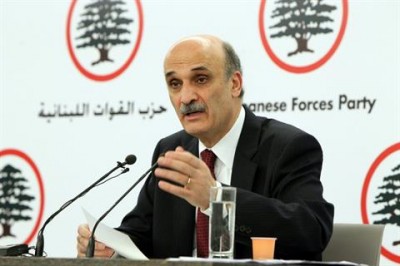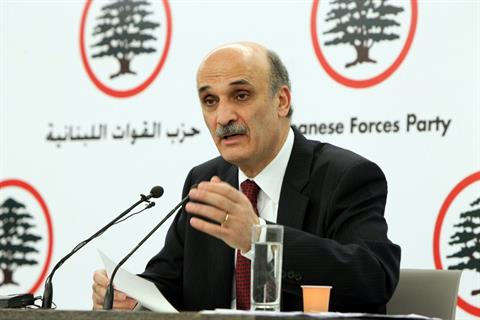
Lebanese Forces leader Samir Geagea questioned on Wednesday Hezbollah chief Sayyed Hassan Nasrallah’s opposition to the United States-led alliance against the Islamic State in Iraq and Syria.
Addressing Nasrallah , Geagea asked: “Would you have opposed the international coalition against the IS had Iran been part of it?”
“We know that Iran wanted to be part of the coalition, but complications in the negotiations over its nuclear program hindered it,” he added following talks with National Liberal Party leader Dory Shamoun.
“We know that the U.S. is keen in seeking its own interests, but what if Lebanon and the U.S. have common interests? Would you still oppose the strikes?” Geagea wondered.
“If Islamists staged a new attack against the army in the northeastern town of Arsal, shouldn’t the army request the international coalition for aerial help?” he asked.
“Wouldn’t the failure to request for this assistance be considered as a form of complicity with the Islamists?” Geagea asked in a possible hint that Hezbollah may be colluding with the Islamic State.
Addressing Nasrallah’s remarks that Lebanon would be faced with dangers should it join the international coalition, Geagea asked: “Doesn’t the intervention in the fighting in Syria pose a greater threat to Lebanon?”
“Shouldn’t you have ordered your MPs to head to parliament and elect a new president had you really wanted to build a strong state?” he stressed
He then addressed Free Patriotic Movement leader MP Michel Aoun and his ongoing boycott of the presidential elections, asking: “What are you waiting for? Why are you continuing the boycott?”
“We could have joined your boycott had you given us a single convincing reason,” he stressed.
“We see no legitimate excuse to maintain the boycott as Lebanon drowns deeper and deeper in chaos, negligence, irresponsibility, and darkness,” Geagea added.
The Hezbollah leader said on Tuesday that he opposed U.S-led air strikes on Syria, where his Lebanese Shi’ite Muslim group has been fighting alongside forces loyal to President Bashar al-Assad.
Nasrallah, whose group is one of the most important helping Assad fight a Sunni-dominated insurgency, was speaking after strikes against Islamic State (IS) and other groups in Lebanon’s neighbor Syria.
“We are against American military intervention and an international coalition in Syria, whether that (action) is against the regime or IS,” Nasrallah said in a speech aired on Hezbollah-run al-Manar television.
“U.S. military intervention, whether under the guise of an international coalition or under the cover of NATO or under the guise of multinational forces: we have a principled position based on basic rules and norms,” he said.
“America, is in our view, the mother of terrorism and the origin of terrorism,” he said, adding this meant the United States was not ethically qualified to lead a “war on terrorism”.
Nasrallah, whose group is backed by Shi’ite Muslim power Iran, has previously described Islamic State as a growing “monster” that could threaten Jordan, Saudi Arabia, Kuwait and other Gulf states.
Hezbollah has sent tens of thousands of fighters into Syria’s civil war. Its role in Syria has helped Assad beat back the rebellion against his rule in critical areas of the country including Damascus and a corridor of territory stretching north from the capital. But large parts of Syria’s less densely-populated north and east have fallen to Islamic State.
The Syrian war spilled into the Lebanese border town of Arsal on Aug. 2, triggering five days of battles between the Lebanese army and militants including members of Islamic State.
Defensive role
Prime Minister Tammam Salam said Tuesday after arriving in New York that Lebanon will have a defensive role in the fight against ISIS .
Salam, who is taking part in the 69th session of the U.N. General Assembly was quoted by Al-Arabiya TV as saying :
“ Lebanon is taking part in the war against ISIS from a defensive position because it lacks the military capabilities to be on the offensive.”
“The danger of terrorism is not limited to Lebanon but in the entire region and we are in need of support,” Salam added.


Leave a Reply
You must be logged in to post a comment.